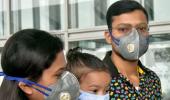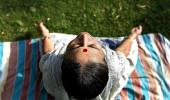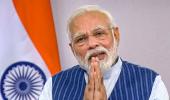'Restrict the amount of time you spend on social media.'
'We have people who are glued to it from morning to night, which is certainly not what we recommend.'
'And do not take the stuff that you read on WhatsApp as sacrosanct.'
'A lot of it is absolutely nonsense.'
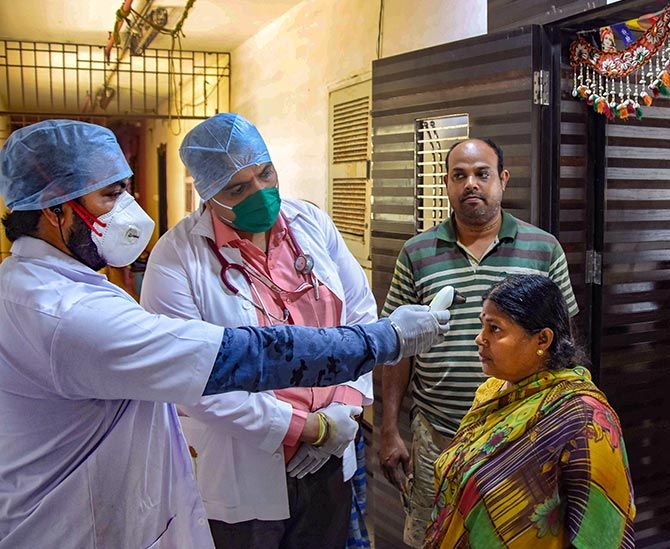
COVID-19 will bring India deaths.
More than even that, it will bring serious mental stress and fear, to many, many people in our nation, depending on how long the lockdown continues and the casualties.
Right now it's about: Older people, or those in poor health, dealing with their fears and frailties.
Those living by themselves grappling with isolation.
Poor people struggling to reach home or earn.
Homeless folks battling starvation.
Or workers on the frontlines coping with panic.
Later it will be about: People looking for fresh jobs.
Folks looking for ways to make up for their financial losses.
Children handling the backlog of school work.
Family and friends getting over the deaths of their dear ones.
Dr Kersi B Chavda, senior psychiatric consultant at three prominent Mumbai hospitals -- P D Hinduja National, Hinduja Healthcare and the Sir H N. Reliance Foundation -- speaks to Vaihayasi Pande Daniel/Rediff.com about the dimensions of mental stress at this time for India and how it can be coped with.

Are you getting people calling you with issues of mental stress?
Yes.
What kind of issues do they have?
Basically, they already have psychiatric issues and there is an aggravation of the anxiety or depression or other symptoms.
Or they didn't have it and they were borderline and are toppling into anxiety and so on.
A lot of old people are absolutely paranoid and freaked out about what they are experiencing now, because they don't know how to cope.
And a lot of people are just, in general, very, very frightened about the future.
Some people are living alone and their family is abroad.
Yes, the isolation...
Not only isolation, but they are hearing about their brother or sister being in a place which is quarantined.
Or maybe their brother's batchmate has got somebody whose got covid (COVID-19), testing positive, so he is freaking out over here and stuff like that.
These are all different types of issues, but what is the kind of advice or help you suggest?
What do you tell people?
If they need psychiatric evaluation then I suggest that they go to the closest hospital and to the emergency (room) to see the psychiatrist (on duty), if you are having a meltdown or you're very suicidal.
I don't think talking to you (talking on the phone) is going to get you cured of it.
You are going to need medication and you might also need hospitalisation, which is not the best thing in the world, given these times.
But if you don't have a choice, you don't have a choice.
It's like saying, suppose you fall and you break your leg right now, it's not that you're going to sit at home and talk to a physiotherapist.
You're going to go to the hospital and get yourself repaired.
So if you are in that situation, which is so very difficult, then you need to get admitted, if it is indicated.
But if it is not so bad, sometimes we talk to them about the medication that they're already on and we suggest that they see a psychiatrist (not necessarily in a hospital).
All my colleagues are accepting patient's calls and adjusting doses as and when necessary, given the guidelines that we are allowed to follow.
We are also coming across situations where just a little reassurance and a little talk and keeping our phone lines open for people, who are already our patients to talk to us, when they feel bereft.
And also allowing other people, who might have got our numbers, to either WhatApp or be in touch with us, so that they feel that there is some connection with the rest of the world.
I think that is the most important thing, especially if you are living alone, or isolated, maybe don't have enough money etc etc.
There are also a lot of organisations who are helping people, who may not be able to get out, who may not be in a situation where they can deal with (getting their own) food, may have to go to a hospital but Uber and Ola are not working.
There are organisations which help out people in distress.
So, there is a lot of stuff that is happening.
 IMAGE: Dr Kersi B Chavda. Photograph: Kind courtesy Dr Kersi B Chavda/Facebook
IMAGE: Dr Kersi B Chavda. Photograph: Kind courtesy Dr Kersi B Chavda/FacebookMay I ask you to name any one or two organisations like this?
Project Mumbai, which is something that I am also associated with, and it has Shishir Joshi (running it). He is the CEO.
Then you have Prafulta (that offers psychiatric counselling), which is doing a lot of work.
The Indian Medical Association is doing a lot of work.
Most states have a psychiatric unit which is working.
So Pune has just started.
Chandigarh has just started something.
We have started here doing stuff. So it's all over. We are attempting to help as much as we can.
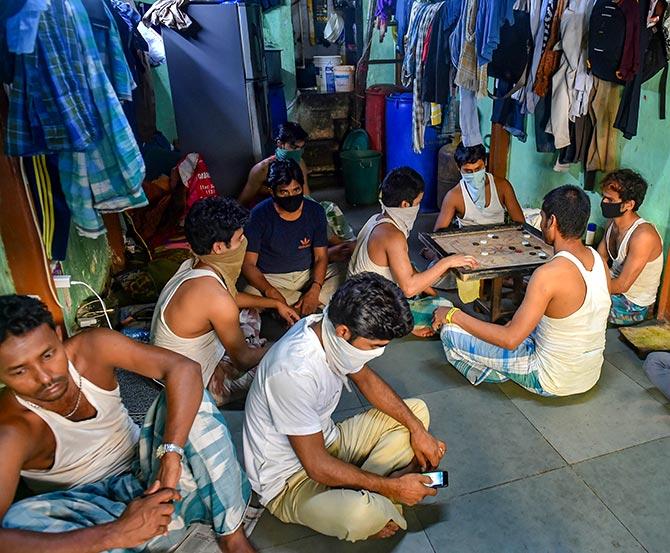
And you are mainly doing only telephone consulting at the moment?
That's correct.
And video.
And these telephonic consultations for you must have really doubled, tripled?
Yes, it has.
I am also attached to three corporate hospitals.
But, of course, our OPDs are not allowed and only emergency patients can be looked at.
So that is something that still goes on.
In addition, yes, there is a huge amount of telephonic consults, which have happened.
Which keeps us at it 12 hours 14 hours a day.
Someone I know well, who is usually slightly unstable, seemed to have got further affected by the COVID-19 situation.
Suddenly he sent some message which sounded suicidal and he was by himself and far away from any of us and there was nothing to do.
I wanted to know if you are sort of checking in, right now, on people, among your patients, who have suicidal tendencies?
Ya, ya.
Fortunately, for most of our suicidal cases it is very unlikely that they will be alone and they are normally have been brought in by their family.
The occasional one, a couple of them, have actually called me to tell me that they are getting these negative feelings again.
And we deal with it the way it has to be dealt with.
And what will be the consequences of people spending long periods at home, especially for children?
I don't even want to look at it right now.
Let us first deal with what is happening right now.
There is absolutely no question in my mind that for a child, it's also going to depend on the way he sees his immediate caregivers react.
If mom and dad or the people around him are positive, and are able to give them information, without absolutely freaking him out, the consequences will be less.
If he sees mom and dad going into paroxysms of anxiety and panic, and stuff like that, then obviously he is going to react in a very bad way.
And what about the stress of everybody sort of glued to the news on television or their phone screens and social media?
We do suggest to people to, as far as possible, restrict the amount of time that they spend on social media.
Even the news is a very frightening thing right now.
Maybe an hour or two at the very most.
We have people who are glued to it from morning to night, which is certainly not what we recommend.
And do not take the stuff that you read on WhatsApp as sacrosanct.
A lot of it is absolutely nonsense.
Do not listen to the remedies that you hear.
Nonsense.
So now it's like tea is going to be very good for you.
Absolute nonsense!

There must be mental stress across all different classes.
Like I'm watching migrants walking home from Delhi to Bareilly.
There are people who are working, in spite of this, garbage collectors, essential services workers etc.
Then, of course, there are people in the slums, who are very unprotected.
They're not even going to be seeking any counselling or psychiatric help.
And they need it, probably the most.
What will happen to them?
Hold on, I don't think that is necessarily true.
I know that all my colleagues in the general and municipal hospitals have guys like these attending.
If not they come to our OPDs even in our corporate hospitals.
They do seek help.
And a lot of people have seen the helpline statements going across and everybody now has WhatsApp on his mobile.
A lot of people have actually even got in touch with us saying that they have seen our number on the various sites, where they have been posted, and they have called us to ask for help.
So yes, I'm sure there are lacunae in this whole thing, but I am equally sure that the poor are not as dispossessed, as they would have been if social media, to some extent, was not available.
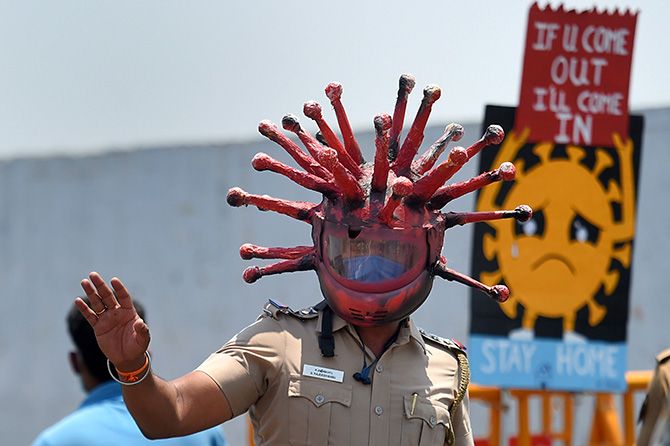
And what about people who are working immediately on the front lines like doctors and nurses.
Have you been consulted by them and how are they faring?
They are having a lot of problems.
In my hospitals we have psychologists and psychiatrists being made, available to them.
Of course, we have put ourselves out in terms of talking to the guys who are out in the frontlines, trying to boost up (their spirits), providing them with as much of positivity as they can.
But it's a horrible thing.
It is the doctors who are going to be the most traumatised and the most affected.
That is certainly going to happen and we will do the best we can.
Theoretical speaking, the mental stresses are going to sort of multiply depending on the length of the lockdown and the number of casualties.
But even if the length of the lockdown is longer, but if casualties are less, do you think that might actually reduce the mental stress maybe?
(Laughs) I am not absolutely certain I can answer this.
I think both have an equally important role to play.
Frankly, I think, you know, if you are locked down, it's directly impinging on you.
So you're probably going to get more affected, if you just see people around you dying.
It sounds very callous, but if you see people around you that are dying, but if you are in a sense free, and not imprisoned in your house, maybe you will cope with it a little better.
Do you expect that a lot of people are going to need help at the end of this in restarting their lives?
Absolutely, absolutely. There is going to be a huge population in terms of physical, in terms of economic...
Has that been seen in other countries already, like China?
It has already been seen.
Yes, already.
We are also going to need a lot of help with the psychological after-effects, because this is going to see a lot of post traumatic issues.
Everybody is in so much of a trauma right now.
We expect to be inundated with people who will be having major psychological problems.
What do you tell older people, or even people who have gone through cancer and are in remission, who are anxious?
What is the best advice you offer them?
The commonest problem is social isolation:
'Doctor, I'm all alone. What am I going to do? How will I cope? My medicines are running out.'
'I have a son who's in Sydney, and two people from his building have suddenly been quarantined.'
'My grandson has been quarantined because somebody in his school has landed up having the covid (COVID-19)virus.'
'Doc, I've suddenly got fever and my throat irritation is not going away.'
'Doctor, I'm feeling absolutely suicidal. I was already having suicidal tendencies before this happened. And now I think I'm going to jump.'
These are the kind of problems that we are facing.
Now it's nice for everybody to be philosophical and to say look at it positively, and do whatever you have to do and read your books...
Try telling that to a person who's suicidal.
Try telling that to a person who can't even talk properly on the phone, because she's crying so much.
Try telling that to a person who's so scared that he's got this virus.
When these clients call up and say, 'Doctor, what am I going to do?' sometimes we really have no answers.
Yes, we tell them, have a routine, eat properly, try to get online to learn something, keep in touch with your family.
A lot of them are not very tech savvy.
So then we try to tell them to get some neighbour, who would normally comes in, because neighbours do look after the older neighbours, and try to get them to teach them at least the basics, so that they can be in touch on a video conference with their family.
And that is what makes the difference eventually.
Yes, you may read as much as you want, because you never have the time to read before.
And you may learn how to knit.
And you know, we have now online courses... where people are teaching painting...
But eventually, it's the contact that is necessary.
It's my appeal to everybody, if you have a neighbour, who you know is alone, for whatever reason, take the trouble, knock on his door, if you can, or at least call him up and talk to him.
And just tell him that you're available. Tell him that he's not alone.
Tell him that he's in your thoughts.
That will make all the difference in the world, that will reduce anxiety.
And do you have any particular anxieties, yourself?
Of course, we are anxious.
It is not very easy for me to go to a hospital and see my young doctors, or my own colleagues, dealing with people, because two of my three hospitals have got facilities for covid (COVID-19).
So we see this happening.
One of my batchmates was getting checked for the possibility of his having it, but fortunately, landed up being negative.
But we were very stressed out.
On our doctor chats, we're hearing about doctors associated with some of our hospitals, who are testing positive.
We are seeing, on television screens about doctors, in Italy, for example, the greatest number of casualties seem to be amongst doctors.
So it's certainly not the best time in the world for us.
